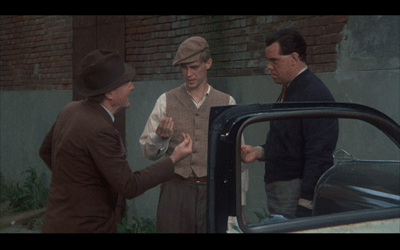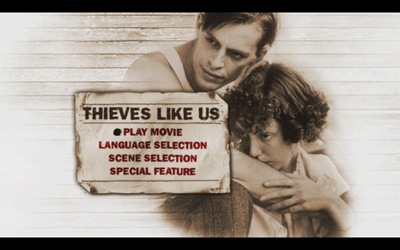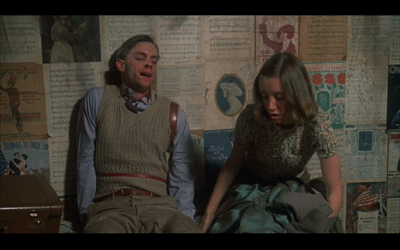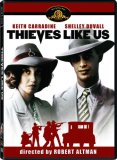| Reviews & Columns |
|
Reviews DVD TV on DVD Blu-ray 4K UHD International DVDs In Theaters Reviews by Studio Video Games Features Collector Series DVDs Easter Egg Database Interviews DVD Talk Radio Feature Articles Columns Anime Talk DVD Savant Horror DVDs The M.O.D. Squad Art House HD Talk Silent DVD
|
DVD Talk Forum |
|
|
| Resources |
|
DVD Price Search Customer Service #'s RCE Info Links |
|
Columns
|
|
|
Thieves Like Us
THE MOVIE:

Robert Altman's 1974 picture Thieves Likes Us is a Depression-era outlaw story in line with other genre touchstones like Bonnie & Clyde and Boxcar Bertha. Keith Carradine plays Bowie, a convicted murderer on the lam with two hardened bank robbers, T-Dub (Bert Remsen) and Chicamaw (John Schuck). They call him "Country Boy" because he hasn't seen much action and still has the smell of the farm on him. Though we don't get much detail about the crime that landed him in the pokey, Bowie's reluctance to speak about it--and his aversion to killing over the rest of the movie--suggests that maybe he didn't intend to take that shop keeper's life. It's more likely it was a robbery gone wrong, forcing his hand in a direction he's not comfortable with it going.
As a trio, T-Dub, Chicamaw, and Bowie cut a path of crime across Mississippi. As with any such story, the road they travel in search of Bank Robber Shangri-La, a score big enough to live off of for the rest of their lives, gets longer and longer the harder they pursue it. Altman makes an interesting choice, avoiding the high-violence or the romantic flash of the crimes. Of all the robberies referenced, only one heist, the final one, is shown on screen. The others are seen from the getaway car. This takes our gaze away from the action, putting a greater emphasis on the moments in between. Thieves Like Us is more concerned with the characters and the effect the lifestyle has on the criminals. T-Dub pursues his libido, Chicamaw chases after the bottom of a bottle, and Bowie wrestles with his conscience.
The main thing luring Bowie away from life on the run is Keechie (Shelley Duvall), a young cousin of Chicamaw's who lives in one of the houses the guys hole up in. He is instantly attracted to her, and after a freak auto accident lays Bowie up for a while, he and Keechie fall in love. As the heat around the trio gets hotter, Keechie doesn't want her man to keep putting himself in danger. She wants love, children, and a normal life, but such things don't have enough power to overcome Bowie's fatalism.
In one scene, sitting on the porch and enjoying the morning while Chicamaw sleeps off the previous night's bender, T-Dub ponders how he could have chosen to have a different life when he was younger. In hindsight it seems so simple. He could have chosen to be a doctor or a lawyer just as easily as he chose to be a crook. Bowie doesn't see it that way. He is what he is, and he reckons he made the best of it he could. Thus, Keechie can never save Bowie from the outlaw road. He'll always have to go back.
Thieves Like Us is based on a novel by Edward Anderson and was previously adapted by Nicholas Ray in 1949 as They Live By Night. This screenplay was first written by Calder Willingham (Rambling Rose), and re-written by Joan Tewkesberry and Altman, the team that would next bring us Nashville. The story follows a straightforward outline, letting the natural path of the crime spree dictate where the characters go rather than relying on stock action-complication-resolution plot structuring. Altman was a master of fostering a sense of realism in his pictures. Shooting on location, taking still-standing structures and dressing them up only as necessary to make them look like it's 1936. This establishes a space for the actors to create more naturalistic performances. Just as a moral line is drawn between the characters, so is there a technical line drawn between the actors. On one side is Schuck and Remsen, playing their hoods more broadly, portraying them as types. Chicamaw is as friendly and boisterous as he is threatening, whereas T-Dub is more gregarious, the smooth talker. The other side is Carradine and Duvall, who speak their lines more casually, almost as if they were improvised. They are the characters who strive for something more real, who want to go straight, whereas the others stay inside the gangster paradigm.

Altman takes an unconventional tack when scoring Thieves Like Us. There is very little music used in the film, and when we do hear a song, it's part of the scene, piped in over a radio the characters are listening to. Most of the time, though, the radios are tuned to dramatic programs. These shows act as commentary, sometimes ironically (Gangbusters talks about the criminals being taken down by law enforcement while the boys get away with the loot), sometimes more subtle (The Shadow seeks the evil in the hearts of men as Chicamaw drinks his way into his first rampage). The exaggerated, overly dramatized stories are in direct contrast to the underplayed onscreen crimes. While these audio tales are set in a cut-and-dried world, the circumstances that compel the men to rob banks make their motivations more complicated. Altman's final audio cue says it all: it's a vaguely socialist sermon on the struggles of the poor.
Even so, Altman isn't excusing anybody. The fates of all three robbers show the price for the wages of sin. Just as their crimes occur offscreen, so do their exits. What happens to them is either reported after the fact, or in the case of the climax, seen from the sidelines. Violence does erupt, but it is over just as quickly as it comes, and the results are final. It's Bowie's fatalism catching up with him. If he only has one choice for what he'll be, then there is only one choice for how he'll go out. Thieves Like Us is graceful in its depiction of this outcome. By staying true to his commitment to realism, Robert Altman stays away from any moralizing. He has faith in the force of his characters, ensuring that any greater lesson the audience walks away with is equal in power to their sentimental connection with the characters--and like with any great crime film, those two things, the intellectual and emotional, are often in opposition to one another. It's one of the classic dance partnerships of American cinema, speaking directly to the fabric of our mythology. The maverick element, as well as the heavy consequences of big risks, is pure Altman, the consummate maverick artist.
THE DVD
Video:
The 1.85:1 widescreen transfer is exceptional. The image is clean, and the colors are really nice, capturing the natural, understated tones of cinematographer Jean Boffety.
Sound:
There are four audio options to choose from: English in both mono and stereo, French in mono, and Spanish in mono (also, subtitles in English and Spanish). Though it's not a high-falutin' mix, the stereo option for the English soundtrack serves the picture nicely. Like the cinematography, the sound mixing has a natural feel to it, and the standard mix works well to preserve the intended sound quality.
Extras:
The lone bonus on the DVD is an audio commentary recorded by Robert Altman ten years ago, judging by his opening statements (he says he made Thieves Like Us 23 years prior). Time has given the director a good perspective on his movie, and his memory is also strong enough to peel back the curtain to give us the behind-the-scenes story of the Thieves Like Us production. There are several places where he stops talking for a stretch, but for the most part, when he does talk, it's interesting.
FINAL THOUGHTS:
One of the auteur's early strolls through various elements of Americana, Thieves Like Us is part of the great canon of early '70s Robert Altman movies. A human story about Depression-era bank robbers, the director keeps all aspects of the production--the writing, art direction, and acting--understated, creating a realistic movie that is also a damn good story. With Keith Carradine as his central thief, and by looking less at the crimes themselves and more at the spaces in between each bank job, Altman shows how the choices these men make shape them and how their determinist world view leaves them with very few options. Highly Recommended.

Jamie S. Rich is a novelist and comic book writer. He is best known for his collaborations with Joelle Jones, including the hardboiled crime comic book You Have Killed Me, the challenging romance 12 Reasons Why I Love Her, and the 2007 prose novel Have You Seen the Horizon Lately?, for which Jones did the cover. All three were published by Oni Press. His most recent projects include the futuristic romance A Boy and a Girl with Natalie Nourigat; Archer Coe and the Thousand Natural Shocks, a loopy crime tale drawn by Dan Christensen; and the horror miniseries Madame Frankenstein, a collaboration with Megan Levens. Follow Rich's blog at Confessions123.com.
|
| Popular Reviews |
| Sponsored Links |
|
|
| Sponsored Links |
|
|
| Release List | Reviews | Shop | Newsletter | Forum | DVD Giveaways | Blu-Ray | Advertise |
|
Copyright 2024 DVDTalk.com All Rights Reserved. Legal Info, Privacy Policy, Terms of Use,
Manage Preferences,
Your Privacy Choices | |||||||













